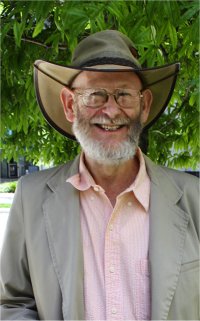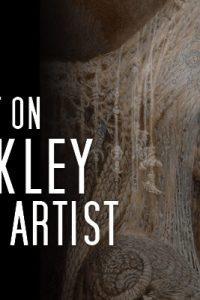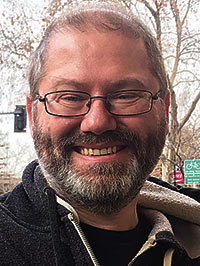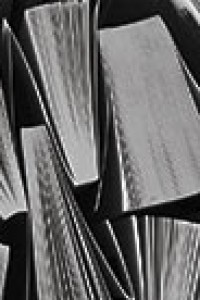Stanley Schmidt: Art of Speculation
 Stanley Albert Schmidt was born March 7, 1944 in Cincinnati OH. He attended the University of Cincinnati, then attended graduate school at Case Western Reserve in Cleveland OH, earning a doctorate in physics in 1969. He spent nine years as a physics professor while ‘‘moonlighting as a science fiction writer.’’ In 1978, he took over as editor of Analog from Ben Bova, a position he held until announcing his retirement in August 2012. In mid-2012 he eclipsed John W. Campbell’s record for the longest time spent editing a single SF magazine.
Stanley Albert Schmidt was born March 7, 1944 in Cincinnati OH. He attended the University of Cincinnati, then attended graduate school at Case Western Reserve in Cleveland OH, earning a doctorate in physics in 1969. He spent nine years as a physics professor while ‘‘moonlighting as a science fiction writer.’’ In 1978, he took over as editor of Analog from Ben Bova, a position he held until announcing his retirement in August 2012. In mid-2012 he eclipsed John W. Campbell’s record for the longest time spent editing a single SF magazine.
Though known best for his editing, Schmidt began publishing his own fiction with ‘‘A Flash of Darkness’’ in Analog (1968). Other notable stories include Nebula Award nominee ‘‘Good Intentions’’ (1998, with Jack McDevitt) and Hugo and Nebula Award finalist ‘‘Generation Gap’’ (2000). Some of his stories have been collected in Generation Gap and Other Stories (2002). His 1970 Analog novelette, ‘‘Lost Newton,’’ was expanded into his first novel in book form, Newton and the Quasi-Apple (1975). His Kyyra series began with The Sins of the Fathers (serialized 1973-74) and continued with Lifeboat Earth (1978). His other novels are Tweedlioop (1987) and Argonaut (2002).
He has also edited many anthologies, including a dozen books collecting fiction from Analog, two books collecting stories from Unknown, Islands in the Sky: Bold New Ideas for Colonizing Space (1996, with Robert Zubrin), and Roads Not Taken (1998, with Gardner Dozois), reprinting the best alternate histories from Analog and Asimov’s. He has also written non-fiction, notably Aliens and Alien Societies: A Writer’s Guide to Creating Extraterrestrial Life-Forms (1996), Which Way to the Future?: Selected Essays from Analog (2001), and The Coming Convergence: The Surprising Ways Diverse Technologies Interact to Shape our World and Change the Future (2008).
Schmidt was a guest of honor at the 1998 Worldcon. He was nominated for the ‘‘best professional editor’’ Hugo Award every year from 1980 until the award was retired in 2006; he has been nominated in the new ‘‘best editor short form’’ category every year since.
Excerpts from the interview:
‘‘Until about the age of nine, I subscribed to the popular view of science fiction as ‘that nonsense about rockets and robots,’ though I was fascinated when my father took me to see Destination Moon, and he said this was something that could really happen. In my earliest years of reading, I read a lot but most of it was non-fiction, and above the grade level I was supposed to be reading. When I tried fiction, I found most of it really dull.
‘‘Finally, my father – a second-generation SF reader, so I’m now a third – said ‘It’s nice that you read so much, but it would be nice if you had a more balanced diet. You should try some good science fiction. It’s not all crazy. Try these.’ And he handed me three volumes of Astoundings from the 1930s that his uncle had bound, and said, ‘Read what’s at the bookmarks.’ He had bookmarks at two of Stanley Weinbaum’s Venus stories, and Lewis Padgett’s ‘Ex Machina’. An hour later, I was hooked for life!”
…
 ‘‘After grad school, I got an assistant professorship at Heidelberg College (recently renamed Heidelberg University) in Tiffin OH. While I was there, they started an experimental program called College Studies. It was a place for professors to try out courses in subjects they were really interested in and would like to teach but that didn’t fit neatly into any of the departmental frameworks. I did one on science fiction….
‘‘After grad school, I got an assistant professorship at Heidelberg College (recently renamed Heidelberg University) in Tiffin OH. While I was there, they started an experimental program called College Studies. It was a place for professors to try out courses in subjects they were really interested in and would like to teach but that didn’t fit neatly into any of the departmental frameworks. I did one on science fiction….
‘‘In the writing portion of the course I taught, what I tried to do was work with my students as closely as possible, exactly the way John [Campbell] worked with me, editor to writer. The student’s goal was to sell me a story. By way of working the story out, I had a meeting with each student, to talk about what idea they had and how they might turn it into a story – the kind of thing Campbell was famous for doing. If I thought the story was good enough to publish, I would accept it immediately. That happened a couple of times. What happened far more often was that I would read it and offer criticisms, with the challenge to find a way to fix it so we would both like it better. Several students said it was the best course they ever had, and a couple of them have sold stories. One of them has been on the Nebula ballot several times.
‘‘At the same time that I was teaching them about science fiction, I was also teaching myself to edit the way Campbell did. It came to pass that I also got drafted onto the committee that invited speakers to campus. I got Ben Bova, when he was editing Analog, to come out and give a general lecture and also to visit my class. I think watching me run my class was what convinced him that I was who he wanted to replace him when he left the magazine. He started grooming me for that before I recognized what he was doing! But when he suddenly announced his resignation, I had a chance to move into this job.”
…
‘‘While, in one sense, I’m proud to keep Analog as hard science fiction, I also sometimes wish that term would go away. So many people use it in a way that they think is what I mean by it, and it’s completely different from what I really mean. Recently I got a story by somebody who said, ‘So and so said I should sell this to Analog because it’s full of clanking hardware.’ I have no intrinsic interest in clanking hardware. What I mean by ‘hard science fiction’ is actually pretty simple: there’s some element of speculative science or technology in it, which is so integral to the story that you can’t take it out without making the whole story collapse.
‘‘The second requirement is that there should be some attempt to make the science or technology speculation plausible. When I was teaching the science fiction course, one of the stories that I had people read was ‘Flowers for Algernon’ (one of my all-time favorites). It’s the quintessential example of meeting the requirement that there has to be some speculative element that you can’t take out without making the story collapse. Everything that’s important to Charlie comes out of that operation. And yet, because there are no rockets or robots and very little is said about the medical details, about half the students in my course were surprised that I even considered it science fiction. On the other hand, everybody thinks of Star Wars movies as science fiction, but they’re what my dad calls ‘really good Westerns with terrific special effects.’”
…
‘‘I am leaving Analog, and I hope to concentrate a lot more on my own writing. It’s not because I’m tired of Analog, but because there are so many other things in the world that I like doing and I haven’t been doing nearly enough for the last 30-plus years. I would like to spend more time on those while I’m still able to. I like to remind people that I am a writer, and not just an editor. If anybody wants a complete list of my fiction that’s available, I do have a website!’’






Pingback:You keep saying ‘hard science fiction.’ I do not think it means what you think it means. [Quote Of The Day]